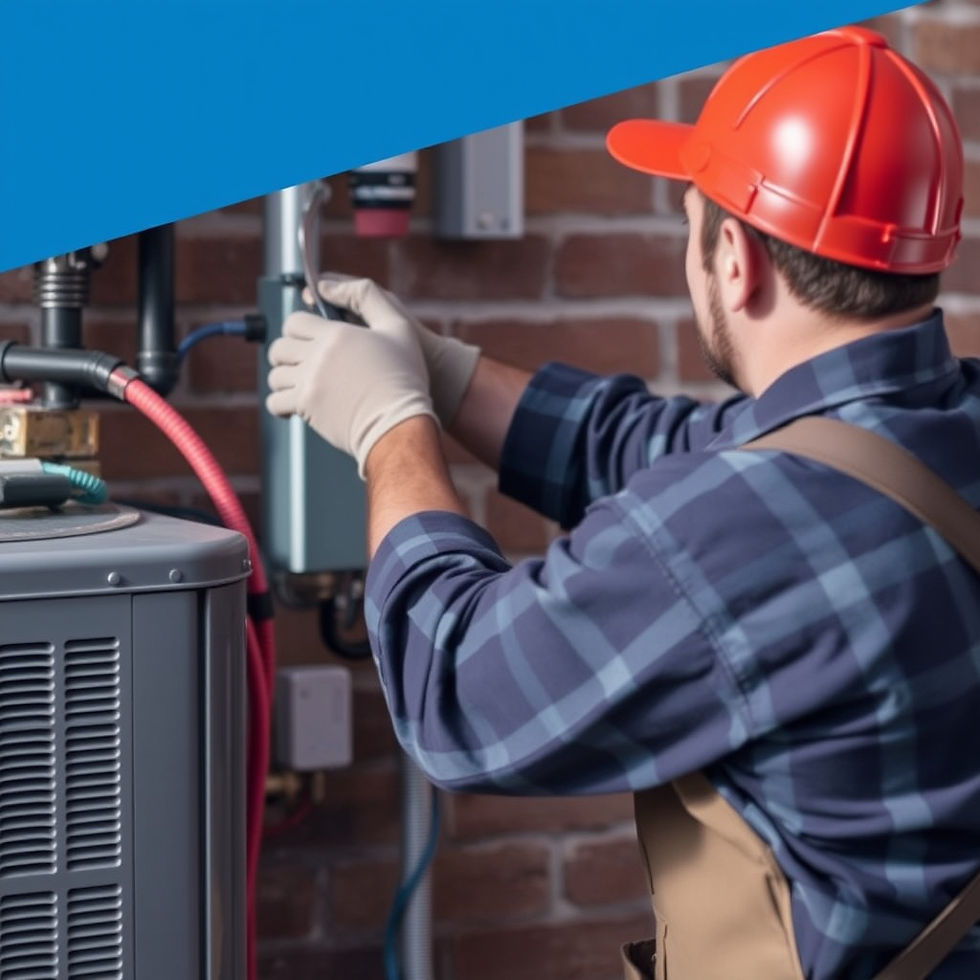DIY Air Conditioner Troubleshooting: Common Issues and Quick Fixes
- dmaling9
- Jul 19, 2024
- 4 min read
DIY Air Conditioner Troubleshooting: Common Issues and Quick Fixes

Summer in Georgia is no joke, with temperatures often soaring and the humidity levels making it feel even hotter. Your air conditioner is your best ally in this battle against the heat, but what happens when it starts acting up? Before you panic and call for professional help, there are several common issues you can troubleshoot and potentially fix on your own. This blog will guide you through some DIY air conditioner troubleshooting tips, helping you keep your home cool and comfortable all summer long.
Safety First: Important Precautions
Before you begin any troubleshooting or repairs, safety should be your top priority.
Here are a few essential safety tips to keep in mind:
- Turn off the power: Always turn off the power to your air conditioning unit before performing any maintenance or repairs. This can usually be done by switching off the breaker in your home's electrical panel.
- Use proper tools: Ensure you have the right tools for the job and use them correctly to avoid injury or further damage to your unit.
- Refer to the manual: Consult your air conditioner's manual for specific instructions and safety warnings related to your model.
- Know your limits: If at any point you feel uncomfortable or unsure about performing a task, it's best to call a professional HVAC technician.
Common Issues and Quick Fixes
1. Air Conditioner Won't Turn On
Possible Causes:
- Tripped circuit breaker
- Faulty thermostat
- Blown fuse
Quick Fixes:
- Check the circuit breaker: Locate your home's electrical panel and check if the circuit breaker for your air conditioner has tripped. If it has, reset it by turning it off and then back on.
- Inspect the thermostat: Ensure your thermostat is set to "cool" and the temperature is set below the current room temperature. Replace the batteries if necessary.
- Check for blown fuses: If your unit has a fuse, inspect it for any signs of damage and replace it if needed.
2. Poor Airflow
Possible Causes:
- Clogged air filter
- Blocked vents
- Dirty evaporator coil
Quick Fixes:
- Replace or clean the air filter: A clogged air filter can restrict airflow and reduce cooling efficiency. Check your filter and replace or clean it according to the manufacturer's instructions.
- Check and clear vents: Ensure that all vents in your home are open and unobstructed by furniture, curtains, or other objects. Clean any dust or debris from the vents.
- Clean the evaporator coil: If accessible, inspect the evaporator coil for dirt and debris. Clean it carefully with a soft brush or cloth, being mindful not to damage the coil.
3. Strange Noises
Possible Causes:
- Loose parts
- Debris in the unit
- Worn-out fan motor
Quick Fixes:
- Tighten loose parts: Inspect your unit for any loose screws, bolts, or panels. Tighten them as needed to eliminate rattling or clanking noises.
- Remove debris: Check the outdoor unit for any debris, such as leaves, twigs, or dirt, that may be causing unusual sounds. Clean the area around the unit to prevent future issues.
- Lubricate or replace the fan motor: If the noise persists, it could be due to a worn-out or malfunctioning fan motor. Lubricate the motor if possible, or consider replacing it if the problem continues.
4. Water Leaks
Possible Causes:
- Clogged condensate drain line
- Damaged drain pan
- Low refrigerant levels
Quick Fixes:
- Clear the condensate drain line: A clogged drain line can cause water to back up and leak from your unit. Use a wet/dry vacuum to remove any blockages, or carefully clean the line with a pipe cleaner or similar tool.
- Inspect and repair the drain pan: Check the drain pan for any cracks or damage. If necessary, repair small cracks with epoxy glue or replace the pan entirely.
- Check refrigerant levels: Low refrigerant levels can cause the evaporator coil to freeze and subsequently leak water. While adding refrigerant is typically a job for a professional, you can inspect the coil for ice buildup and defrost it by turning off the unit and allowing it to thaw.
5. Warm Air Blowing from Vents
Possible Causes:
- Thermostat issues
- Dirty air filter
- Refrigerant leak
Quick Fixes:
- Adjust the thermostat: Ensure the thermostat is set to "cool" and the temperature is set appropriately. Verify that the thermostat is working correctly and replace the batteries if needed.
- Replace the air filter: A dirty air filter can restrict airflow and cause your unit to blow warm air. Replace the filter if it appears dirty or clogged.
- Check for refrigerant leaks: While fixing a refrigerant leak requires professional expertise, you can check for signs of a leak, such as hissing sounds or oily residue around the unit. If you suspect a leak, contact an HVAC technician for further assistance.
When to Call a Professional...
While many common air conditioner issues can be resolved with a bit of DIY troubleshooting, some problems require the expertise of a professional HVAC technician. Here are a few scenarios where it's best to seek professional help:
- Persistent problems: If you've tried the troubleshooting tips above and your air conditioner is still not functioning correctly, it's time to call in a professional. Persistent issues could indicate a more serious underlying problem that requires expert attention.
DIY air conditioner troubleshooting can save you time and money, helping you maintain a cool and comfortable home during Georgia's hot summer months. By following these tips and performing regular maintenance, you can keep your air conditioning system running smoothly and efficiently. Remember to always prioritize safety and know your limits—when in doubt, don't hesitate to contact a professional HVAC technician.




Comments